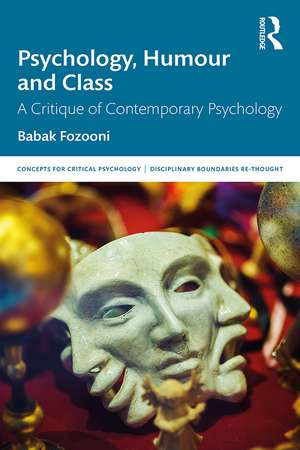Psychology, Humour and Class: A Critique of Contemporary Psychology: Concepts for Critical Psychology
Autor Babak Fozoonien Limba Engleză Paperback – 7 apr 2020
By fusing the best of the three psychologies with political and cultural critiques, the book poses the question: what if class conflict and the crises of psychology are related? This is precisely the Gordian Knot which Fozooni tries to untangle. First, the author demonstrates how psychology has traditionally veered towards either an upper-class or a middle-class paradigm. With the demise of these two old paradigms a new understanding of psychology is gradually emerging - a postpsychology. Describing how ‘mainstream’ and ‘critical’ psychologies are undergoing late-life crisis, and ‘postpsychology’ is experiencing its birth pangs in an environment hostile to its existence, the book provides an alternative narrative of psychology. The author suggests that whilst all three forms of psychology have contributed to our self-comprehension, it is only postpsychology that possesses the attributes necessary for a global remaking of humanity.
Tackling the discipline of psychology head-on, Fozooni pits against it a series of scathing yet tongue-in-cheek critiques, making this fascinating and provocative reading for all students and academics interested in psychology, as well as the general reader.
| Toate formatele și edițiile | Preț | Express |
|---|---|---|
| Paperback (1) | 416.22 lei 6-8 săpt. | |
| Taylor & Francis – 7 apr 2020 | 416.22 lei 6-8 săpt. | |
| Hardback (1) | 1003.43 lei 6-8 săpt. | |
| Taylor & Francis – 7 apr 2020 | 1003.43 lei 6-8 săpt. |
Din seria Concepts for Critical Psychology
-
 Preț: 295.98 lei
Preț: 295.98 lei - 5%
 Preț: 273.42 lei
Preț: 273.42 lei -
 Preț: 110.27 lei
Preț: 110.27 lei -
 Preț: 278.26 lei
Preț: 278.26 lei -
 Preț: 301.30 lei
Preț: 301.30 lei -
 Preț: 287.65 lei
Preț: 287.65 lei - 5%
 Preț: 264.67 lei
Preț: 264.67 lei -
 Preț: 294.41 lei
Preț: 294.41 lei -
 Preț: 294.72 lei
Preț: 294.72 lei -
 Preț: 285.94 lei
Preț: 285.94 lei -
 Preț: 191.23 lei
Preț: 191.23 lei - 18%
 Preț: 995.54 lei
Preț: 995.54 lei -
 Preț: 358.19 lei
Preț: 358.19 lei - 18%
 Preț: 1000.27 lei
Preț: 1000.27 lei -
 Preț: 387.65 lei
Preț: 387.65 lei - 5%
 Preț: 363.52 lei
Preț: 363.52 lei - 18%
 Preț: 999.12 lei
Preț: 999.12 lei -
 Preț: 347.76 lei
Preț: 347.76 lei -
 Preț: 348.18 lei
Preț: 348.18 lei - 17%
 Preț: 236.10 lei
Preț: 236.10 lei -
 Preț: 358.19 lei
Preț: 358.19 lei -
 Preț: 358.56 lei
Preț: 358.56 lei - 18%
 Preț: 993.49 lei
Preț: 993.49 lei -
 Preț: 361.08 lei
Preț: 361.08 lei - 18%
 Preț: 1157.34 lei
Preț: 1157.34 lei - 18%
 Preț: 1109.18 lei
Preț: 1109.18 lei - 18%
 Preț: 1106.02 lei
Preț: 1106.02 lei - 18%
 Preț: 1010.95 lei
Preț: 1010.95 lei -
 Preț: 363.20 lei
Preț: 363.20 lei - 20%
 Preț: 242.61 lei
Preț: 242.61 lei - 18%
 Preț: 993.97 lei
Preț: 993.97 lei -
 Preț: 361.08 lei
Preț: 361.08 lei -
 Preț: 364.10 lei
Preț: 364.10 lei -
 Preț: 344.90 lei
Preț: 344.90 lei
Preț: 416.22 lei
Nou
Puncte Express: 624
Preț estimativ în valută:
79.64€ • 83.32$ • 66.16£
79.64€ • 83.32$ • 66.16£
Carte tipărită la comandă
Livrare economică 03-17 aprilie
Preluare comenzi: 021 569.72.76
Specificații
ISBN-13: 9781138614123
ISBN-10: 1138614122
Pagini: 384
Ilustrații: 29
Dimensiuni: 138 x 216 x 23 mm
Greutate: 0.45 kg
Ediția:1
Editura: Taylor & Francis
Colecția Routledge
Seria Concepts for Critical Psychology
Locul publicării:Oxford, United Kingdom
ISBN-10: 1138614122
Pagini: 384
Ilustrații: 29
Dimensiuni: 138 x 216 x 23 mm
Greutate: 0.45 kg
Ediția:1
Editura: Taylor & Francis
Colecția Routledge
Seria Concepts for Critical Psychology
Locul publicării:Oxford, United Kingdom
Public țintă
Postgraduate and UndergraduateCuprins
Preface Apologia Introduction Part One: Mainstream Psychology as Upper Class Prescriptions Chapter 1: Freud and social class Chapter 2: Hirschfeld, class and sexuality Chapter 3: Watsonian capitalism Chapter 4: Maslow and peak capitalism Chapter 5: Carl Rogers: the bolo tie ‘internationalist’! Part Two: Critical Psychology as Middle Class Musings Chapter 6: Frankl: The inconvenient existentialist Chapter 7: Laing: The naughty existentialist! Chapter 8: For Foucault’s sake Chapter 9: Billig: the sultan of critical psychology Chapter 10: Parker and critical psychology: OK, now what? Part Three: Postpsychology as Working Class Stutterings Chapter 11: Giambattista Vico, imagination and postpsychology Chapter 12: Joseph Dietzgen: (one of) our philosophers! Chapter 13: Alfred Sohn-Rethel and rabid capitalism Chapter 14: Erich Fromm and postpsychology Chapter 15: Antonin Artaud and embodiment Chapter 16: Vygotsky is postpsychology! Chapter 17: Bakhtin completes Vygotsky Chapter 18: Luria completes Bakhtin who completed Vygotsky! Discussion List of references
Notă biografică
Babak Fozooni is an associate lecturer at the Open University and the author of "What is Critical Social Research? Volumes 1 and 2 (2012, 2017). He has taught at the University of East London, the University of Westminster, Birkbeck College and the Open University. He writes from a working-class perspective.
Descriere
This book critically examines three forms of contemporary psychology through analogy with humour associated with three different class perspectives: mainstream psychology; critical psychology; post psychology. By fusing the three psychologies with political and cultural critiques, the author demonstrates a new way of ‘doing’ psychology.
